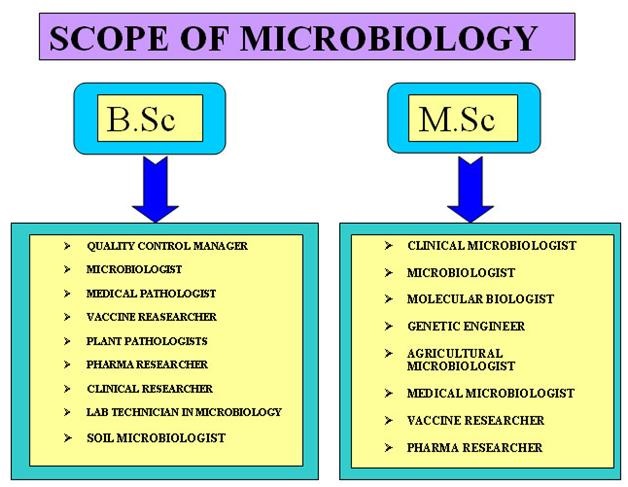
Microbiology courses
Microbiology is a branch of science which deals with the study of microorganisms and their activities. The microorganisms influence each and every aspect of our lives. They are inside us, outside and around us. Microorganisms include: bacteria, viruses, fungi, protozoa, algae, etc. which are commonly known as microbes.
The microorganisms play a very prominent role in various basic and important realm of life. They can be used to make drugs, to manufacture biofuels, to clean up pollution, to degrade the biodegradable wastes, to control the disease and to produce and process food and beverages.
It is true that vaccines were developed against smallpox using the microorganisms and Fleming discovered penicillin.
There are different branches of microbiology courses which can be divided into two types the first being Pure Science and second one being the Applied Sciences.
Pure microbiology has a deeper study of the subject at the theoretical level but Applied microbiology is a study where we apply certain processes involving microorganisms: example brewing for fermentation.
Pure microbiology
Here are few most important branches categorised under Pure Microbiology.
Bacteriology –the study of bacteria.
Mycology –study of fungi.
Protozoology - the study of protozoa.
Phycology - the study of algae.
Parasitology – the study of parasites.
Immunology – the study of immune system.
Virology –the study of viruses.
Nematology – the study of nematodes.
Microbial cytology –the study of microscopic information of microorganisms.
Microbial physiology –the study of how the microbial cell functions biochemically including the study of microbial growth metabolism and its cell structure.
Microbial pathogenesis – the study of effect of pathogens on the microbes. microbial ecology the relationship between the environment and the microorganisms.
Microbial genetics – the study of how genes are organised
Applied Microbiology
Medical microbiology is a study of pathogenic microbes which cause any illness and also to discover the microbes in the human causing various diseases.
Pharmaceutical microbiology study of microorganisms related to antibiotics, enzymes and vaccines.
Industrial microbiology the use of microbes in the industrial fermentation and wastewater treatment which is very closely linked to biotechnology field. This includes brewing also.
Microbial biotechnology includes using the microbes at the genetic level to generate useful products.
Food Microbiology study of the microorganisms which cause the food spoilage as well as food borne diseases.
Agricultural Microbiology studies microorganisms which are classified into plant microbiology and plant pathology and soil microbiology.
The career prospects of microbiology.
You can get lucrative jobs in India as well as abroad otherwise get placements in hospitals and clinical laboratories as microbiologists.
You can even pursue a PhD or even become a lecturer.
The list of jobs offered after studying microbiology are as follow:
Research assistant.
Food, industrial or environmental microbiologist.
Quality assurance technologist.
Clinical and veterinary microbiologist.
Biomedical scientist.
Medical technologist.
Clinical research associate.
Food technologist.
Scientific laboratory technician.
Research scientist.
POST GRADUATION MSc Microbiology Part Time Course Admissins are in Progress
|| TOP RATED WITH A+ GRADE IN TS & AP ||
Please feel free to contact us :
VijethaCollege.Org (Since 2001)
Group of Institutions: Vasavi Educational Group
OPP PASSPORT OFFICE,Near Clock Tower
State Bank of India Building, First Floor ,Opp. Metro Pillar No : 21
SECUNDERABAD. www.VijethaCollege.Org
Principal : 8501057777. 040-27705677 ( 32 Lines )
Principal office : 040-27705677 
www.VijethaCollege.org ( ESTD : 2001 )
STUDENTS GALLERY CLICK https://vijethaacademy.org/gallery.php
STUDENTS ONLINE CLASSES CLICK https://vijethaacademy.org/gallery.php